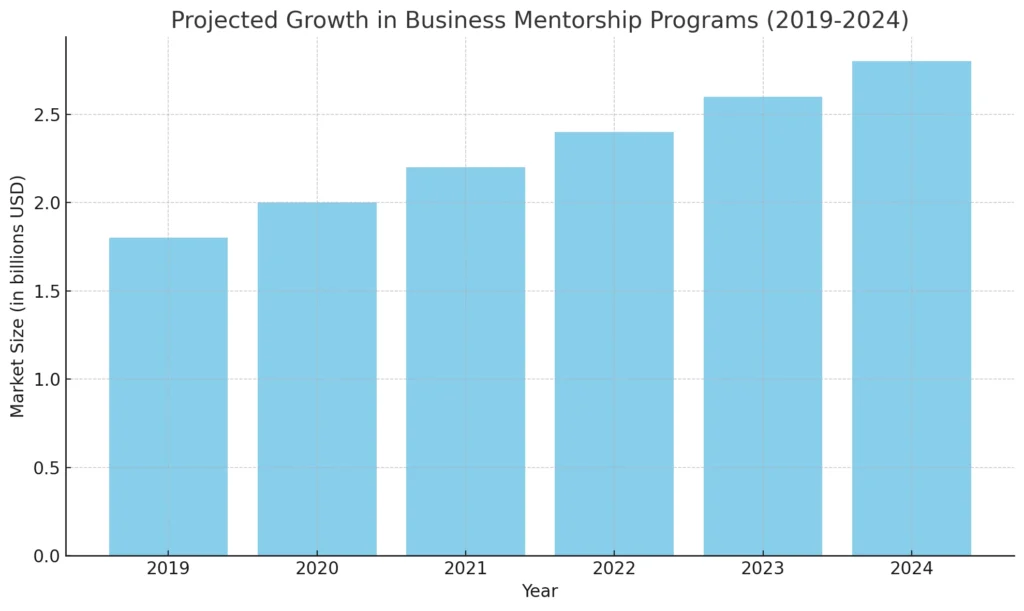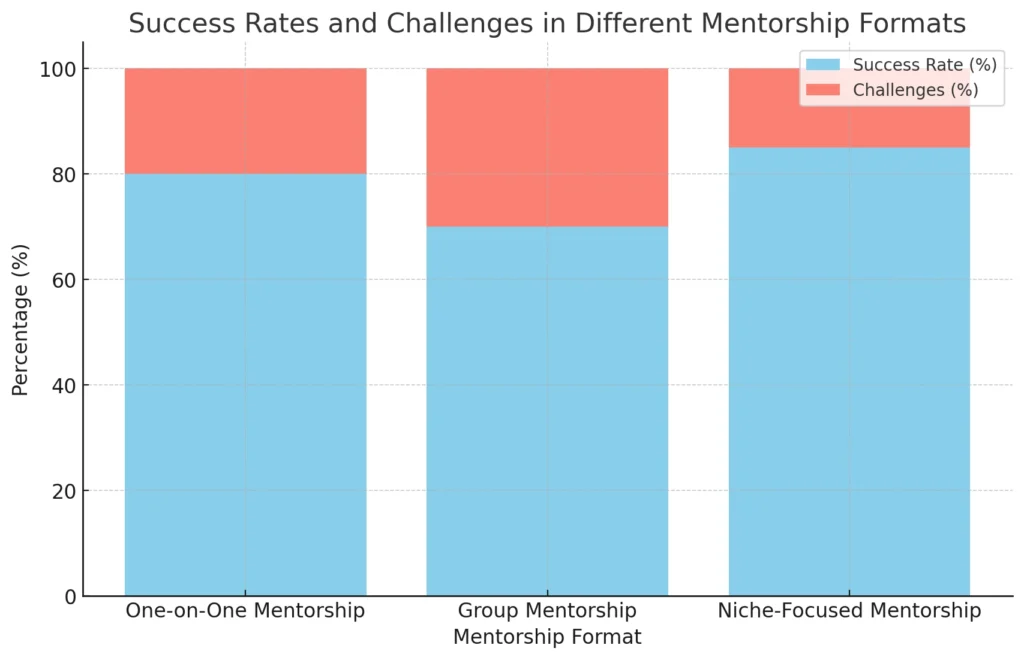In today’s fast-paced and competitive business environment, mentorship programs have become essential tools for aspiring entrepreneurs and startups. A well-structured business mentorship program not only provides guidance but also bridges the gap between knowledge and experience, helping new businesses navigate challenges and seize growth opportunities. As more individuals venture into entrepreneurship, the demand for mentorship programs has surged, creating a ripe landscape for startups in this space.
Whether you’re an experienced business leader looking to share your expertise or an entrepreneur who wants to create a structured mentorship platform, the business mentorship industry offers vast potential. Indústria statistics show a steady increase in demand, with projected growth driven by the need for personalized guidance and network-building in nearly every sector. From offering one-on-one coaching to developing group mentorship initiatives, the opportunities are broad, allowing for creative and scalable approaches.
| Metric | Statistics | Descrição |
|---|---|---|
| Market Size | $2.6 billion (2024)** | Estimated value of the global mentorship and coaching industry, reflecting the demand for business mentorship programs. |
| Annual Growth Rate | 7.5% | The industry’s average annual growth rate, driven by the rise in entrepreneurship and startup culture. |
| Key Growth Drivers | Increased Entrepreneurship, Digital Access | Key factors include the surge in entrepreneurship, need for guidance, and the accessibility of digital platforms enabling virtual mentorship. |
| Customer Segments | Small Businesses, Startups, Solo Entrepreneurs | Primary users of business mentorship programs, particularly those seeking guidance in growth, scalability, and strategy in early stages. |
| Projected Value by 2030 | $4.5 billion | Anticipated growth of the mentorship industry, showing the increasing significance of structured guidance for businesses. |
Why Choose Business Mentorship Programs?

Launching a successful business is no easy feat, and for many, a strong support system is the difference between growth and stagnation. Business mentorship programs provide that essential support, making them invaluable for new entrepreneurs. By connecting aspiring business owners with seasoned professionals, mentorship programs offer insights, advice, and resources that accelerate progress and help avoid costly mistakes.
Today, mentorship has evolved beyond traditional one-on-one coaching. Entrepreneurs are seeking mentorship in innovative forms, including virtual mentorship, group sessions, and on-demand guidance, making this field diverse and adaptable to various needs. The rise in demand for personalized business guidance is rooted in the growing complexity of the market and the unique challenges entrepreneurs face, from funding issues to brand building and customer acquisition. Business mentorship programs help break down these challenges, providing a structured roadmap and trusted guidance that fosters confidence and clarity.
The mentorship industry’s growth is fueled by trends such as remote working, digital communication, and the importance of strong networks. With more people pursuing entrepreneurship, especially in the digital and creative sectors, the value of mentorship has skyrocketed. This growth represents a golden opportunity for those looking to start a mentorship program focused on business development.
Also Read:- AI in Modern Business Solutions
Current Trends and Future Opportunities in Business Mentorship
The landscape of business mentorship is transforming rapidly, fueled by technological advancements and evolving entrepreneurial needs. One prominent trend is the shift toward digital mentorship platforms. With remote work on the rise, entrepreneurs are seeking mentors who can provide virtual guidance, making mentorship accessible regardless of location. This shift not only increases flexibility but also enables mentors to reach a global audience, expanding market potential significantly.
In addition to digital platforms, group mentorship programs are gaining popularity. Group sessions bring together like-minded entrepreneurs, fostering peer learning and collective problem-solving. This format allows mentees to gain insights from multiple perspectives, making mentorship richer and more dynamic. Furthermore, specialized mentorship programs are emerging to address niche industries such as tech startups, green businesses, and e-commerce. These programs cater to specific business needs, offering targeted guidance that traditional mentorship often lacks.
Artificial intelligence (AI) is another exciting frontier in mentorship. AI-driven platforms can match mentors and mentees based on detailed profiles, goals, and industry expertise, enhancing the quality of each match. Additionally, AI can assist in tracking progress, setting reminders for follow-up sessions, and even providing data-driven insights to enhance mentorship outcomes. As AI continues to evolve, the mentorship experience will become even more personalized and impactful.
The future holds immense potential for innovation in mentorship programs. By staying adaptable and leveraging technology, mentorship startups can continue to meet the changing demands of new entrepreneurs, ensuring their guidance remains relevant and effective.
When discussing AI-driven matching systems and advancements in personalized mentorship, you could use this phrase to refer to a reliable source that explains AI integration in mentorship.
| Trend/Technology | Descrição | Impact on Mentorship Programs |
|---|---|---|
| Virtual Mentorship Platforms | Online platforms that facilitate remote mentorship sessions and communications. | Increases accessibility and allows mentors to reach a global audience. |
| Group Mentorship Programs | Mentorship format that brings multiple mentees together with one or more mentors. | Enhances peer learning, diverse perspectives, and collaborative growth. |
| Specialized Niche Mentorship | Programs tailored to specific industries, such as tech startups, eco-businesses, etc. | Provides targeted guidance relevant to niche industries and challenges. |
| AI-driven Matchmaking | AI-powered systems that pair mentors and mentees based on goals, profiles, and expertise. | Improves match quality and personalizes the mentorship experience. |
| Progress Tracking with AI | AI tools that track progress, remind sessions, and analyze performance data. | Offers data-driven insights and continuous support for mentees. |
As 10 melhores ideias para programas de mentoria empresarial para startups
Starting a business mentorship program opens the door to numerous approaches, each offering unique benefits to aspiring entrepreneurs. Here are the top 10 innovative ideas for a mentorship startup, complete with essential insights into each concept’s value, requirements, and potential markets.
1. Virtual One-on-One Mentorship Platform
- Descrição: Offer personalized, online mentorship sessions that connect mentors and mentees globally.
- Startup Requirements: User-friendly platform, secure video conferencing, scheduling tools.
- Target Market: Aspiring entrepreneurs, remote workers, and startups.
- Estimated Costs: Medium – primarily technology and platform development.
2. Group Mentorship Programs
- Descrição: Facilitate group sessions where mentees can learn collectively, share ideas, and resolver problemas together.
- Startup Requirements: Virtual event software, mentor training for group dynamics.
- Target Market: Early-stage startups, incubator programs, and educational institutions.
- Estimated Costs: Low to Medium – focus on logistics and platform integration.
3. Specialized Mentorship for Niche Industries
- Descrição: Develop mentorship programs focused on specific industries, like tech, retail, or green business.
- Startup Requirements: Industry experts, content tailored to niche challenges.
- Target Market: Entrepreneurs in niche fields who need specialized guidance.
- Estimated Costs: Variable – depends on industry and mentor experience.
4. AI-Enhanced Mentorship Matching
- Descrição: Use AI to pair mentees with mentors based on detailed profile matching and goals.
- Startup Requirements: AI software, profile database, robust algorithms.
- Target Market: Entrepreneurs looking for tailored mentorship.
- Estimated Costs: High – AI development and data handling.
5. On-Demand Mentorship Services
- Descrição: Offer on-demand, short-term mentorship for specific issues or quick consultations.
- Startup Requirements: Mobile-friendly app, quick scheduling, available mentors.
- Target Market: Startups needing flexible, immediate advice.
- Estimated Costs: Low to Medium – primarily technology and scheduling tools.
6. Corporate Mentorship Programs for Startups
- Descrição: Develop programs where experienced corporate mentors assist budding startups in their industry.
- Startup Requirements: Corporate partnerships, alignment of business goals.
- Target Market: Startups wanting corporate experience and insights.
- Estimated Costs: Medium – focus on partnerships and corporate onboarding.
7. Mentorship Bootcamps and Workshops
- Descrição: Host intensive, short-term mentorship events or workshops on business topics.
- Startup Requirements: Event organization, guest mentors, venue or online platform.
- Target Market: Entrepreneurs needing quick skill upgrades.
- Estimated Costs: Variable – depends on event scale and venue.
8. Subscription-Based Mentorship Programs
- Descrição: Provide continuous mentorship access through a subscription model, offering sessions, resources, and community.
- Startup Requirements: Membership management, regular content updates.
- Target Market: Entrepreneurs looking for ongoing support.
- Estimated Costs: Medium – platform management and mentor availability.
9. Peer-to-Peer Mentorship Networks
- Descrição: Create a network where entrepreneurs mentor each other based on shared experiences and skills.
- Startup Requirements: Community-building platform, user profiles, matching algorithms.
- Target Market: Entrepreneurs at similar business stages.
- Estimated Costs: Low – community management and platform upkeep.
10. Mentorship Programs for Minority and Underrepresented Entrepreneurs
- Descrição: Focus on mentorship for minority or underrepresented groups in business, supporting diversity in entrepreneurship.
- Startup Requirements: Community outreach, specialized mentors, cultural competence.
- Target Market: Minority entrepreneurs seeking mentorship.
- Estimated Costs: Medium – outreach and community engagement.
| Mentorship Program Idea | Estimated Startup Costs | Target Market | Profit Potential |
|---|---|---|---|
| Virtual One-on-One Mentorship Platform | Medium | Aspiring entrepreneurs, remote startups | Alto |
| Group Mentorship Programs | Low to Medium | Early-stage startups, educational institutions | Medium |
| Specialized Mentorship for Niche Industries | Variable | Entrepreneurs in niche fields | Alto |
| AI-Enhanced Mentorship Matching | Alto | Entrepreneurs seeking tailored mentorship | Alto |
| On-Demand Mentorship Services | Low to Medium | Startups needing flexible, immediate advice | Medium |
| Corporate Mentorship Programs for Startups | Medium | Startups seeking corporate insights | Alto |
| Mentorship Bootcamps and Workshops | Variable | Entrepreneurs needing quick skill upgrades | High (event-based) |
| Subscription-Based Mentorship Programs | Medium | Entrepreneurs seeking ongoing support | High (recurring revenue) |
| Peer-to-Peer Mentorship Networks | Low | Entrepreneurs at similar stages | Medium |
| Mentorship Programs for Minority and Underrepresented Entrepreneurs | Medium | Minority entrepreneurs | High (community impact) |
Real-World Examples or Case Studies

Real-world success stories often serve as powerful motivators for entrepreneurs. Within the business mentorship industry, several startups have made a significant impact by innovating the mentorship experience. These examples illustrate how mentorship programs can create substantial value for new entrepreneurs while addressing the specific needs of their target markets.
One such success story is that of MentorMe, a platform that focuses on connecting early-stage entrepreneurs with industry-specific mentors. Launched in response to the growing demand for mentorship in tech and creative sectors, MentorMe has successfully matched hundreds of mentees with mentors across fields like digital marketing, software development, and e-commerce. The platform’s unique approach, which includes progress tracking and goal-setting tools, has helped mentees achieve measurable milestones, leading to higher satisfaction and retention rates.
Another inspiring example is EmpowerHer, a mentorship program dedicated to supporting women entrepreneurs. By focusing on community building and peer support, EmpowerHer has created a thriving ecosystem where women can access mentorship, funding advice, and business resources. This approach has made a difference in diverse industries, from wellness to tech, helping women entrepreneurs overcome unique challenges in their business journeys. EmpowerHer’s commitment to its mission has resulted in high engagement and successful partnerships with organizations looking to support gender equality in entrepreneurship.
FutureMinds is yet another successful mentorship initiative, emphasizing AI-powered mentorship matching. Using AI to pair mentees and mentors based on goals, location, and industry expertise, FutureMinds ensures that each mentorship relationship is well-suited and productive. This tailored approach has led to efficient and impactful mentorship, with a success rate higher than traditional methods. The AI-driven model also allows for flexibility, making FutureMinds a popular choice for mentees seeking on-demand guidance.
Also Read:- Digital Platforms and Mentorship Transformation
Mistakes to Avoid When Starting a Business Mentorship Program
Launching a mentorship program can be incredibly rewarding, but it also comes with unique challenges. By recognizing and avoiding common pitfalls, new mentorship businesses can set themselves up for success. Here are some critical mistakes to watch out for and how to avoid them.
1. Lack of Clear Objectives
- Mistake: Without well-defined goals, a mentorship program can lose focus, leaving mentors and mentees unsure of the purpose.
- Solution: Establish clear objectives for the program, whether it’s skill-building, networking, or startup guidance. This clarity will ensure that each mentorship relationship remains focused and productive.
2. Poor Mentor-Mentee Matching
- Mistake: Mismatched mentor-mentee pairs can lead to frustration and lackluster outcomes, as mentees may not get the guidance they truly need.
- Solution: Use a thoughtful pairing process, considering factors like industry expertise, goals, and communication style. Some programs even use AI-based tools for matching to increase compatibility.
3. Inconsistent Communication
- Mistake: Infrequent or irregular communication weakens the mentor-mentee relationship, hindering growth and engagement.
- Solution: Set a regular meeting schedule and encourage both parties to stick to it. Many successful programs also provide structured communication tools, like goal trackers and progress reminders.
4. Failure to Provide Ongoing Support
- Mistake: Launching a mentorship program without continuous support can leave mentors and mentees feeling disconnected or unsupported.
- Solution: Create a support system for mentors and mentees, such as check-ins, feedback sessions, or community forums, to keep engagement high and address challenges as they arise.
5. Overlooking the Need for Feedback and Improvement
- Mistake: Ignoring feedback from participants can cause a program to stagnate and fail to meet the evolving needs of its users.
- Solution: Implement regular feedback loops, such as surveys or interviews, to gather insights from mentors and mentees. Use this feedback to refine and enhance the program continuously.
By avoiding these common mistakes, mentorship programs can create valuable experiences for both mentors and mentees, leading to better outcomes and higher satisfaction.
Within the section on avoiding mismatches between mentors and mentees, this phrase could guide readers to an in-depth resource on best practices in matching.
| Common Mistake | Descrição | Preventive Measure |
|---|---|---|
| Lack of Clear Objectives | Failing to define program goals, causing lack of direction for mentors and mentees. | Set specific objectives (e.g., skill-building, networking) to keep focus. |
| Poor Mentor-Mentee Matching | Mismatched pairs leading to ineffective guidance and frustration. | Use careful matching criteria or AI tools to pair based on compatibility. |
| Inconsistent Communication | Irregular meetings or communication breakdowns weaken relationships. | Establish a regular meeting schedule and provide tracking tools for progress. |
| Failure to Provide Ongoing Support | Lack of continuous support leaves participants feeling disconnected. | Offer check-ins, feedback sessions, and community forums to maintain engagement. |
| Overlooking the Need for Feedback and Improvement | Ignoring participant feedback can lead to stagnation. | Implement feedback loops (surveys, interviews) to refine the program. |
Why Trust Miracuves Solutions for Your Next Project?
Choosing the right partner to bring your mentorship program vision to life can be the key to success. Miracuves Solutions stands out as a trusted provider with a proven track record in developing innovative, user-focused platforms that prioritize client goals. With expertise in ready-made solutions tailored to various industries, Miracuves Solutions understands the unique needs of business mentorship startups, from seamless platform integration to intuitive user experiences.
Our team at Miracuves Solutions is committed to delivering high-quality results with a focus on efficiency and cost-effectiveness. We bring advanced technology, such as AI-driven matching systems, and data-driven insights to ensure every mentorship platform we develop meets industry standards and the expectations of users. Our clients enjoy tailored solutions at a fraction of the global cost, with timelines that keep pace with today’s fast-moving market.
Soluções Miracuves is dedicated to building long-term partnerships with our clients. With a deep understanding of mentorship dynamics, we not only develop powerful platforms but also provide guidance to help you launch and sustain a successful program. When you choose Miracuves Solutions, you gain a partner invested in the growth and success of your mentorship startup.
Conclusão
Starting a business mentorship program can be a powerful way to make a difference in the lives of aspiring entrepreneurs while building a rewarding business. With a solid plan, clear objectives, and a commitment to providing genuine support, a mentorship program has the potential to create lasting value in the business community. Each of the top ideas we’ve covered provides a unique path to success, from virtual mentorship platforms to niche-specific guidance, showing that there’s a model for every vision and target audience.
Launching a successful mentorship startup involves careful planning, ongoing adaptation, and a deep understanding of what your mentees need. With tools like AI-driven matching, virtual communication, and group-based mentorship, you’re equipped to build a program that not only supports growth but inspires innovation. The journey from concept to launch can be challenging, but with the right steps and parcerias, your mentorship program can thrive.
If you’re ready to take the leap, begin with a clear focus on your goals and market needs. With dedication, adaptability, and the right resources, your mentorship program can help shape the next generation of successful entrepreneurs.
Perguntas frequentes
What are the main benefits of starting a business mentorship program?
Starting a business mentorship program can provide value to entrepreneurs, helping them avoid mistakes, gain industry insights, and grow faster. Mentorship also enhances community engagement and builds a supportive business ecosystem.
How much does it cost to start a mentorship program?
Costs can vary based on program format and features. A basic mentorship platform might have low to moderate costs, while specialized or AI-enhanced programs could require a higher investment.
What skills are necessary to run a successful mentorship program?
Key skills include effective communication, industry knowledge, organizational skills, and the ability to connect people meaningfully. Familiarity with digital tools is also essential for virtual programs.
How can I ensure successful mentor-mentee matches?
Using structured matching criteria, such as shared industry, goals, and personality fit, can help. AI-based tools can further refine the matching process by analyzing detailed profiles.
What are some strategies to keep participants engaged?
Setting clear goals, offering regular check-ins, and encouraging open communication are crucial. Additionally, creating a community aspect, like group sessions or discussion boards, can foster ongoing engagement.





























































